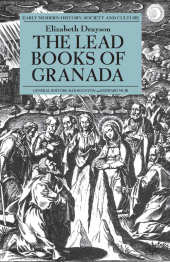 Neuerscheinungen 2013Stand: 2020-01-07 |
Schnellsuche
ISBN/Stichwort/Autor
|
Herderstra▀e 10
10625 Berlin
Tel.: 030 315 714 16
Fax 030 315 714 14
info@buchspektrum.de |

E. Drayson
The Lead Books of Granada
1st ed. 2013. 2013. xv, 289 S. 216 mm
Verlag/Jahr: SPRINGER PALGRAVE MACMILLAN; PALGRAVE MACMILLAN UK 2013
ISBN: 1-349-47135-6 (1349471356)
Neue ISBN: 978-1-349-47135-5 (9781349471355)
Preis und Lieferzeit: Bitte klicken
Hailed as early Christian texts as important as the Dead Sea Scrolls, yet condemned by the Vatican as Islamic heresies, the Lead books of Granada, written on discs of lead and unearthed on a Granadan hillside, weave a mysterious tale of duplicity and daring set in the religious crucible of sixteenth-century Spain. This book evaluates the cultural status and importance of these polyvalent, ambiguous artefacts which embody many of the dualities and paradoxes inherent in the racial and religious dilemmas of Early Modern Spain. Using the words of key individuals, and set against the background of conflict between Spanish Christians and Moriscos in the late fifteen-hundreds, The Lead Books of Granada tells a story of resilient resistance and creative ingenuity in the face of impossibly powerful negative forces, a resistance embodied by a small group of courageous, idealistic men who lived a double life in Granada just before the expulsion of the Moriscos.
Timeline
Acknowledgements
Preface
1. A Mystery Unfolds
2. Books of Spells or Sacred Revelations?
3. History, Religion, Culture: Conspiracy in Context
4. Prime Suspect: Alonso del Castillo
5. Miguel de Luna: Hoaxer, Heretic or Hero?
6. ┤As Precious as the Ark of the Covenant┤
7. Unification in Opposition: The Strategy Of Ambivalence
8. Opposing Factions
9. Acts of Rebellion
10. Fact, Fiction, Myth: The Afterlife of the Lead Books
11. The Lead Books Today
Appendix 1. Titles of the Lead Books
Appendix 2. Summaries of the Content of the Lead Books
Appendix 3. Translation of the Lead Book entitled Libro de la Historia de la Verdad del Evangelio
Appendix 4. A Translator at Work
Appendix 5. ┤Al monte santo de Granada┤, Sonnet by Luis de Gˇngora
Select Bibliography
Index
"Across the book┤s eleven chapters, the author surveys the history and use of the forgeries from their discovery to the present day, focusing particularly on questions of authorship and contexts of production and reproduction. ... there is much in this book that will be of use to scholars and students alike, and the translations and summaries of sources are particularly welcome." (Rosa Vidal Doval, Modern Language Review, Vol. 112, October, 2017)
"Drayson┤s well-written book is a timely addition to a renewed scholarly interest in early-modern forgery and its role in the cultivation of new forms of critical inquiry along with the cultivation of religious and national heritage through antiquities (forged or authentic), as exemplified in the works of Katrina Olds and Katie Harris, among others. ... for non-Spanish speakers, Drayson┤s translations throughout the text and in the appendices will be of particular value." (Claire Gilbert, The Catholic Historical Review, Vol. 102 (1), Winter, 2016)
"This excellent book by Elizabeth Drayson, the first full-length study in English of the events surrounding the discovery in Granada in the late sixteenth century of strange manuscripts ... is therefore a very welcome addition. The story itself is straightforward enough: how it evolved, who it involved, and what it was all about are, however, anything but straightforward and Drayson does an excellent job in navigating the at times treacherous waters on which some of the protagonists were sailing." (Trevor J. Dadson, Hispanic Research Journal, Vol. 17 (3), June, 2016)
"The target audience for this book will be Anglophone readers in search of a manageable overview of the affair of the lead books. The book┤s usefulness is increased by its appendices of primary sources in translation, including an English translation of one of the plomos, a comprehensive list of all twenty-two lead books, and a brief summary of each. For these efforts the author is to be commended." (Katrina B. Olds, Bulletin of Spanish Studies, Vol. 93 (9), 2016)


